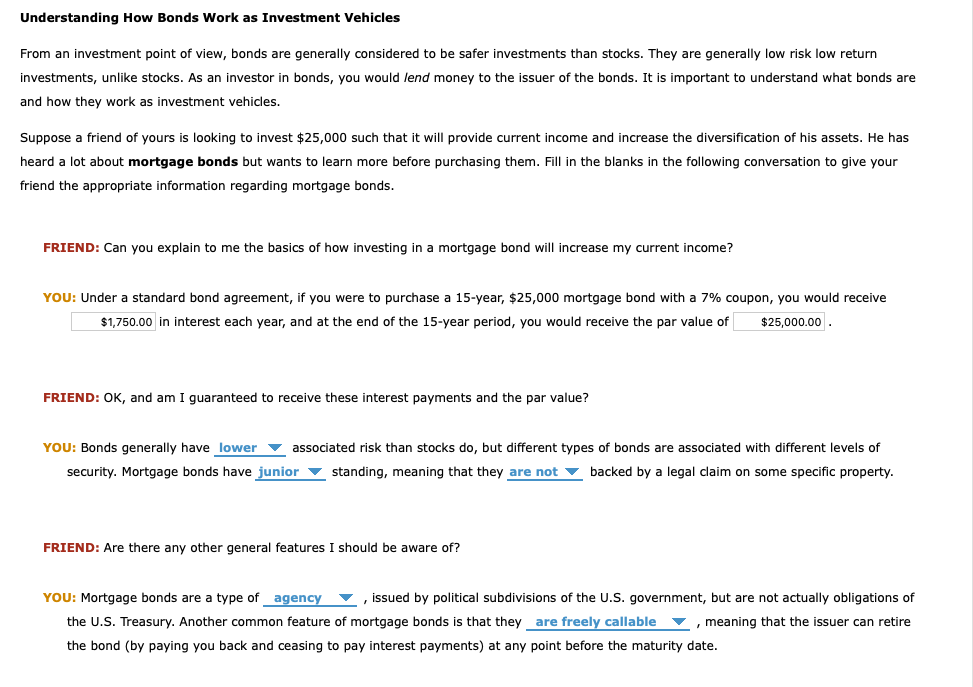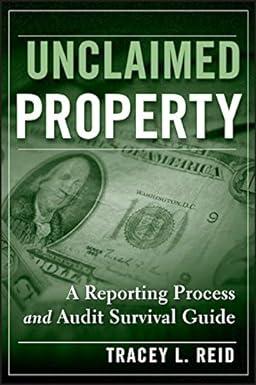can you fixed my answers please if this is incorrect 

Understanding How Bonds Work as Investment Vehicles From an investment point of view, bonds are generally considered to be safer investments than stocks. They are generally low risk low return investments, unlike stocks. As an investor in bonds, you would lend money to the issuer of the bonds. It is important to understand what bonds are and how they work as investment vehicles. Suppose a friend of yours is looking to invest $25,000 such that it will provide current income and increase the diversification of his assets. He has heard a lot about mortgage bonds but wants to learn more before purchasing them. Fill in the blanks in the following conversation to give your friend the appropriate information regarding mortgage bonds. FRIEND: Can you explain to me the basics of how investing in a mortgage bond will increase my current income? YOU: Under a standard bond agreement, if you were to purchase a 15-year, $25,000 mortgage bond with a 7% coupon, you would receive $1,750.00 in interest each year, and at the end of the 15-year period, you would receive the par value of $25,000.00 FRIEND: OK, and am I guaranteed to receive these interest payments and the par value? YOU: Bonds generally have lower associated risk than stocks do, but different types of bonds are associated with different levels security. Mortgage bonds have junior standing, meaning that they are not backed by a legal claim on some specific property. FRIEND: Are there any other general features I should be aware of? YOU: Mortgage bonds are a type of agency , issued by political subdivisions of the U.S. government, but are not actually obligations of the U.S. Treasury. Another common feature of mortgage bonds is that they are freely callable , meaning that the issuer can retire the bond (by paying you back and ceasing to pay interest payments) at any point before the maturity date. FRIEND: So if the interest rate were to fall and the issuer were able to retire my bond, I would be better holding the bond, because if I reinvest the money the issuer returns to me, I would receive a lower off than if I were to continue interest rate. call premium ., but this generally would not fully compensate you for YOU: Exactly. In such a case, the issuer would pay you a your loss. FRIEND: Got it. Thanks for your help! YOU: Any time! Understanding How Bonds Work as Investment Vehicles From an investment point of view, bonds are generally considered to be safer investments than stocks. They are generally low risk low return investments, unlike stocks. As an investor in bonds, you would lend money to the issuer of the bonds. It is important to understand what bonds are and how they work as investment vehicles. Suppose a friend of yours is looking to invest $25,000 such that it will provide current income and increase the diversification of his assets. He has heard a lot about mortgage bonds but wants to learn more before purchasing them. Fill in the blanks in the following conversation to give your friend the appropriate information regarding mortgage bonds. FRIEND: Can you explain to me the basics of how investing in a mortgage bond will increase my current income? YOU: Under a standard bond agreement, if you were to purchase a 15-year, $25,000 mortgage bond with a 7% coupon, you would receive $1,750.00 in interest each year, and at the end of the 15-year period, you would receive the par value of $25,000.00 FRIEND: OK, and am I guaranteed to receive these interest payments and the par value? YOU: Bonds generally have lower associated risk than stocks do, but different types of bonds are associated with different levels security. Mortgage bonds have junior standing, meaning that they are not backed by a legal claim on some specific property. FRIEND: Are there any other general features I should be aware of? YOU: Mortgage bonds are a type of agency , issued by political subdivisions of the U.S. government, but are not actually obligations of the U.S. Treasury. Another common feature of mortgage bonds is that they are freely callable , meaning that the issuer can retire the bond (by paying you back and ceasing to pay interest payments) at any point before the maturity date. FRIEND: So if the interest rate were to fall and the issuer were able to retire my bond, I would be better holding the bond, because if I reinvest the money the issuer returns to me, I would receive a lower off than if I were to continue interest rate. call premium ., but this generally would not fully compensate you for YOU: Exactly. In such a case, the issuer would pay you a your loss. FRIEND: Got it. Thanks for your help! YOU: Any time








